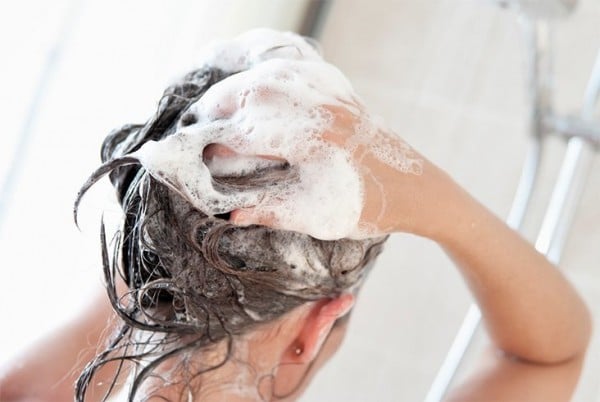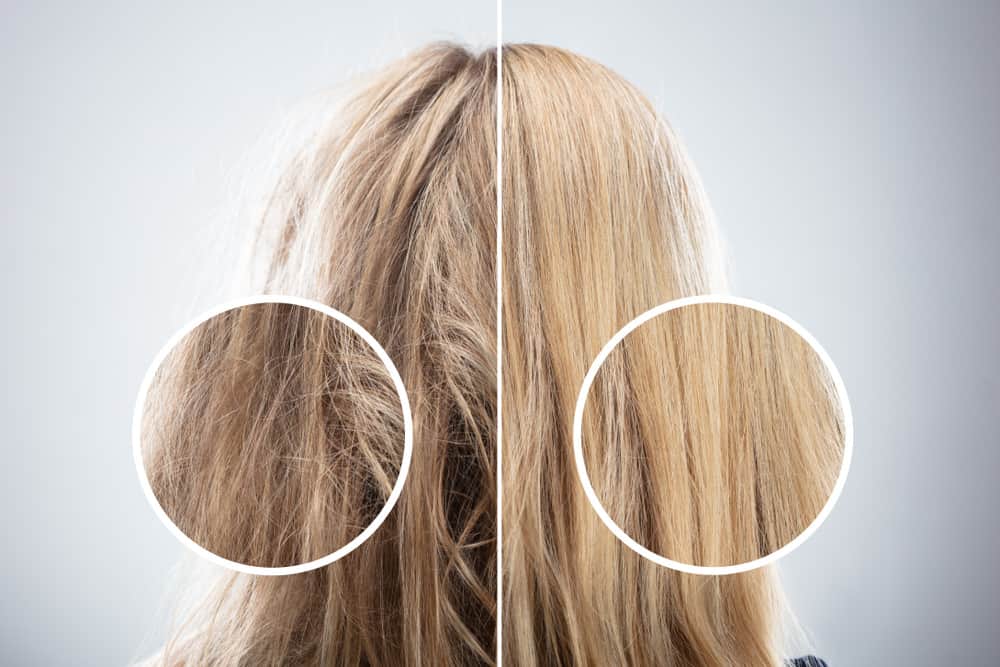Table Of Content

A hairdresser will also be able to give advice for maintaining healthy hair and addressing any current issues people may be experiencing. You might want to rethink brushing your hair when it’s wet. "Amazing stuff. I use it with #0. I a so glad I found Olaplex, it has really helped to restore my hairs health. It's shinier, healthier, softer, stronger and has less breakage." "I've added the Nº.7 bonding oil to my daily routine and it helps repair the blowout frizziness, now a necessity I can't do without." Jojoba is frequently added to conditioners, but you can add some to what you currently own. You can also work a dime-to-quarter-sized amount of pure oil through your ends while your hair is damp.
Ask Your Stylist for an In-Salon Treatment

"Use a pretreatment or oil on the scalp before shampooing and massage the product using a scalp massager to stimulate blood circulation, promoting hair growth and healthy hair," she says. Shampooing is the first step in any hair care routine, and it's an important one. "Having a good hair care routine is key to having strong hair," Hurtado says. "Using the proper shampoo for your hair type and texture is the first step to having healthy, luscious hair." An overly aggressive shampoo can remove too much of your hair’s natural oils. This can leave you with strands that are difficult to untangle and that frizz when dry.
Heat and lack of moisture
When the cuticle has been compromised in such a way, the hair has trouble retaining moisture as well. "Keeping the hair well hydrated [and] moisturized will prevent the hair from snapping off," Diaz-Santin says before stating that banishing dryness is especially beneficial for preventing hair breakage in cold weather. Unusually dry hair may be one of the precursors to damage and breakage. Certain nutrients help your hair grow and stave off breakage from damage.
How To Repair Hair Breakage, According To Experts
Once you've finished conditioning and rinsing, make sure to gently dry your hair. "You should never rub aggressively with a towel, as that can cause breakage and tangles," Hurtado says. "It's best to squeeze out excess water using a microfiber towel, which is gentle on the hair. It also helps reduce frizz and tangles." Too much sun exposure can make your hair brittle and more prone to breakage. Lighter-colored hair, like blonde and gray, is also more susceptible to sun damage.
Suave Professionals Coconut Oil Infusion Damage Repair Conditioner

As the cuticle is further damaged or completely lost, the hair strand can start to fray, or split in pieces, at ends or in other areas. All of the dermatologists we spoke to for this story tell us that sleeping on a silk or satin pillowcase can also help reduce breakage, due to the slicker nature of the fibers — they're much gentler on your strands. Slip makes gorgeous silk pillowcases, but if their prices are a little too steep, Kitsch also has a good offering of satin ones.
Hair that’s lacking natural oils is often rough, dull, and prone to static electricity and tangles. Properly hydrated hair is less likely to get tangled or knotted. If conditioner alone isn’t enough, consider adding a leave-in conditioner or detangler to your routine.
Amika The Kure Multi-Task Repair Treatment
A severe shock or stress can cause the hair roots to reach the resting stage of their growth cycle before they are meant to and the hair comes loose from the scalp. Hot weather and humid climates can also dry the hair out and increase the risk of breakage. People may not need to brush their hair as much as they think. The American Academy of Dermatology advise only brushing hair as much as people need to style it.
Best hair loss shampoos and conditioners for 2024 UK - Good Housekeeping uk
Best hair loss shampoos and conditioners for 2024 UK.
Posted: Fri, 26 Apr 2024 07:00:00 GMT [source]
However, with the proper products and techniques, this concern can be addressed. Revamping your wash day routine with targeted shampoos, conditioners, and treatments can help restore strength and shine to your hair. Implementing hair care practices like gently drying with microfiber towels and applying heat protectants before using hot tools can also make a world of difference.
Chemical dyes can remove your hair’s natural moisture, quickly making smooth hair coarse to the touch. "An easy way to see if you have hair breakage is to do a strand test," says Young. One older 2009 clinical trial found that brushing less frequently led to reduced hair loss in women. When you step out of the shower, it’s a natural response to rub a towel on your skin and hair. However, this rubbing motion actually damages your hair when it’s most vulnerable (after being wet).
Being gentle with your hair while it’s experiencing change is important so as not to exacerbate any thinning. It goes without saying that excessive heat and chemical treatments aren’t a good idea, but try and opt for protective hairstyles too. “Opt for hairstyles that minimize tension on the hair follicles, such as loose braids, buns or ponytails,” advises Gaboardi. “Avoid tight hairstyles and hair accessories that pull on the hair and handle your hair with care to minimise breakage and damage. There are myriad reasons your hair could be breaking off, but there are some hair types that are more predisposed to breakage.
Studies have shown that structural changes in hair fibers are the result of brushing, shampooing, and other types of grooming, especially when they're done when hair is wet. Colored and permed strands are even more susceptible to this kind of damage. Combat split ends by avoiding vigorous brushing and one too many shampoo sessions (our experts recommend washing your hair one to three times a week depending on your hair and skin type). Though it's on the pricier side, this leave-in treatment from K-18 is worth every single penny. Formulated with a patented peptide, this mask repairs hair damage from bleach, color, chemical services, heat, and more.
“Color-treated or chemically treated hair can be more fragile and prone to damage due to the processes altering the natural bonds of your hair,” says Eaddy. “Reducing the amount of times that you slick your hair back into a ponytail, a bun, or even braided styles can dramatically help to reduce the stress placed on the hair,” says Brown. “If you’re a person that gets their hair chemically treated often with highlights or even overall color, spacing out your sessions can be helpful. Of course, reducing the stress your hair experiences through heat styling will also yield positive results. “If you’re finding breakage or think you are experiencing breakage, try to eliminate excessive heat and always be extra gentle of tension when the hair is wet–that is when hair is at its most vulnerable,” adds Colombini. Using products like heat protectors, turning down your hot tools to a lower temperature, or sleeping on silk pillowcases are simple ways to care for your hair.
Rinse it out and then wash your hair with a clarifying shampoo like Ouidad's Ready, Set, Clean Pre-Shampoo Scalp + Hair Rinse ($28) to remove any residue. Another unconventional yet on-trend way to conceal split ends is with the "hair tuck," in which you'd leave the bottom of your hair tucked into the neckline of your shirt or jacket. This works best with high-neck tops (such as turtlenecks) or outerwear with a strong, defined collar that will actually help keep the hair in place. However, if you have textured hair take caution, as natural hair may be very delicate and tucking it might cause breakage.
15 Fast Home Treatments to Repair Damaged Hair Naturally - Parade Magazine
15 Fast Home Treatments to Repair Damaged Hair Naturally.
Posted: Fri, 26 Apr 2024 22:43:55 GMT [source]
New York City-based dermatologist Neil Sadick, M.D., FAAD, previously told Allure that he found in clinical research that stress can do physical damage to your hair. "Increased levels of stress hormones — mainly cortisol — disrupt the hair cycle," Sadick explained. So, if work is super hectic or you're going through an emotionally traumatic event and you're experiencing breakage, you may want to talk to your doctor about whether or not stress is your main problem. Use a vitamin to support hair and scalp health, like HAIR LA VIE Clinical Formula Hair Vitamins, which contain a comprehensive blend of nutrients to help grow, strengthen and protect the hair. Try mixing three tablespoons of olive oil with two tablespoons of raw honey. Apply the mixture to shampooed hair and leave it in for 20 to 30 minutes.
“Are you aggressively brushing your hair, especially when it's wet? If you answered yes, you are doing your hair a disservice and more likely to see breakage and have brittle hair,” Min warns. Izquierdo also points to brushing wet hair as an unexpectedly common cause of hair breakage, and suggests only using a wide-tooth comb to gently detangle before drying. When you're shopping for shampoo, look for one suitable for your hair type that is rich in moisture and sulfate-free. Try Monday Hair Care's Moisture Shampoo or the Best of Beauty-winning Carol's Daughter Wash Day Delight Water-to-Foam Shampoo With Rose Water. Weekly deep conditioners come highly suggested by Dr. Yadav, and if you ask us, they're a must.
To get the best results, Montana recommends starting with thoroughly shampooed and towel-dried hair. "Natural oils are very heavy, so be sure to start small and add more as needed, staying off the hair’s roots," she says. For the treatment, take a scoop of coconut oil (about a quarter of a handful), and work it into your hair from the ends to mid-shaft. Then, clip your hair up, wrap it up in a towel or plastic wrap, and wait 30 minutes before rinsing it out. It’s worth noting that consistency is as important as the remedy itself. “At-home treatments work only if you actually do them regularly and stick to a schedule,” says Leatherwood.

No comments:
Post a Comment